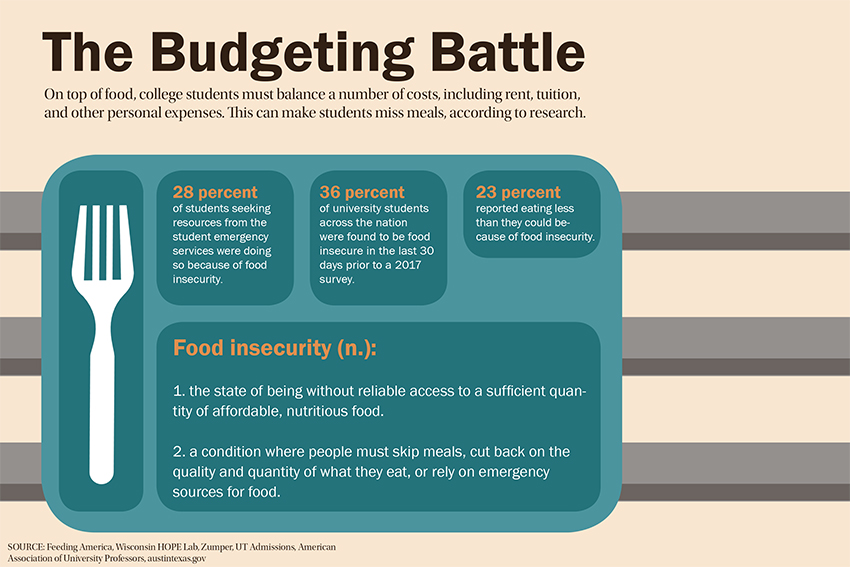Note: Some last names have been omitted out of respect for the privacy and safety of sources.
Savannah had a choice. She could buy a hamburger from the dollar menu, filling her stomach with greasy food. She could drive to H-E-B and buy groceries with whatever money she had left after paying for gas. Or, she could go to work and save money for a better meal tomorrow. Savannah is among the 23 percent of students at UT-Austin who have experienced food insecurity, or a lack of food due to financial stress, according to UT’s University Health Services Survey based on fall 2016 enrollment numbers. This number is lower than the national average of 36 percent of food insecure college students, according to a study of 66 universities by Temple University and the Wisconsin Hope Lab, released April 3.
“If you have to worry about whether or not you can eat one day, that’s going to put a lot of stress on you,” Savannah said. “Over time, it wears on you.”
In order to combat food insecurity and similar financial emergencies, Student Emergency Services in the Office of the Dean of Students offer a variety of resources — one-time grants, grocery store gift cards and the new food pantry and career closet opening in May.
Kelly Soucy, director of Student Emergency Services, said students will be able to receive 20 meals each month from the pantry when it opens. Soucy said the pantry is a more long-term solution for food-insecure students than one-time donations.
Student Emergency Services are also partnered with Austin Energy, which gave UT $29,000 to assist different students with paying utility bills this year.
“A lot of students don’t realize that we’re here and can provide that kind of support,” Soucy said. “There is a stigma on campus saying that all of our students are doing well and there aren’t these concerns, and we know that’s not true.”
200 students received assistance from Student Emergency Services last year, and Soucy said she hopes the stigma can be erased so more students will feel comfortable enough to ask for help.
“We have high achievers on this campus, and so the thought of even sharing with a friend, ‘I’m struggling in this area,’ is hard,” Soucy said. “We want to encourage the UT community to have these conversations and say it’s okay to struggle. We’re here to help.”
Savannah said she visited the Financial Office to seek out financial assistance while struggling to pay tuition and rent. She said she filled out a Special/Unusual Circumstances Appeal Form, but did not learn about the University’s additional resources. Needing another way to make money, she turned to what others view as a taboo occupation: stripping.
Savannah said her new financial security has helped alleviate the psychological pressure she has been under since starting college.
“I have anxiety and depression, and I had to take a bunch of medication for it last semester and up until this semester,” Savannah said. “As soon as I got this job … I don’t have to take anything anymore.”
Madeline Nassif, social and service chair for the Social Work Council, said she has had to adjust her lifestyle to spend less while in college. Nassif, social work junior, said she recognizes this shift can be more dramatic for her less fortunate peers, who could be forced to choose between buying a meal and buying a textbook or Wi-Fi.
“People always should have their basic needs taken care of,” Nassif said. “People shouldn’t have to worry about (that) in exchange for an education.”





















